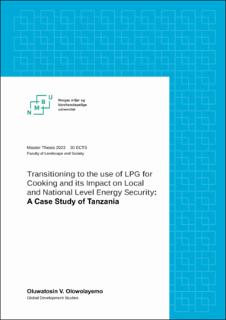TRANSITIONING TO THE USE OF LPG FOR COOKING AND ITS IMPACT ON LOCAL AND NATIONAL ENERGY SECURITY
Master thesis
Permanent lenke
https://hdl.handle.net/11250/3080514Utgivelsesdato
2023Metadata
Vis full innførselSamlinger
- Master’s theses (LandSam) [1033]
Sammendrag
The global energy crisis disruption to the balance of demand and supply in the energy market has attracted global attention to energy security, particularly in the global south where access to "clean and affordable energy" is a significant concern, and the region's vulnerability in the energy market.
Considering the energy crisis, vulnerability as a country in the global south, the promotion of the use of LPG for cooking despite the lack of domestic source for it further calls for attention. The government has highlighted the health risks associated with emissions from inefficient combustion, and environmental concerns, and has developed policies to guide this transition. This raises important questions about whether global institutions and the Tanzanian government are adequately considering the trade-offs between promoting clean cooking, ensuring energy security, and national security in their policies and strategies.
This qualitative study assesses energy policies and their contribution towards achieving energy security, and whether national security and economic issues are considered in their formulation. Three main findings in this study are; First, there was no mention of energy security in the National Energy Policy, the major document guiding the energy sector in Tanzania. Secondly, the transition to the use of LPG places a high financial cost on Tanzania, thereby making the economy vulnerable to energy market fluctuations which could have an overall impact on the national economy. Lastly, the understanding of energy security among stakeholders is shaped by sectoral interest, and this was displayed in the policy document relevant to each institution.
